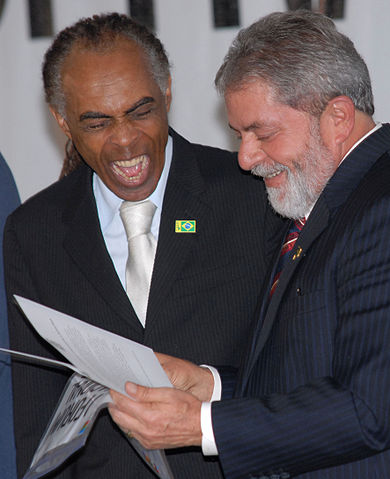Advox members Marianne Diaz and Sarah Myers are reporting live from the NETmundial global Internet governance meeting taking place from April 23-24 in Sao Paulo, Brazil. Civil society, corporate, and government representatives from around the world have gathered to debate the future of Internet governance in a post-Snowden world. This post is part of series of features on the event.
Last night at Arena NETmundial, an open venue where public events are taking place alongside the official NETmundial meeting, an all-star panel discussed the question of creating a global “Magna Carta” for the Web.

Gilberto Gil and former Brazilian president Lula. Photo by Wilson Dias/Agencia Brasil via Wikimedia Commons (CC BY 3.0)
Participants included World Wide Web inventor Tim Berners-Lee; UN Special Rapporteur on Freedom of Opinion and Expression Frank La Rue; former Brazilian Minister of Culture Gilberto Gil; Demi Getschko, member of the Brazilian Internet Steering Committee (CGI.br) and an original proponent of Internet adoption in Brazil; and Alessandro Molon [pt], the congressman rapporteur of the Marco Civil. The five open Internet advocates discussed the importance of the establishment of legal principles and standards allowing for the protection of human rights on the Web worldwide.
Frank La Rue described the Internet as a fundamental vehicle for realizing certain human rights, from access to information and dissemination of information, to freedom of speech, association, cultural diversity and the right to development. In this regard, he pointed out that Internet access cannot be the privilege of a small minority of people, but rather that it must be an instrument of equality, at a very minimal economic cost, if any.
Commenting on the broader discussion on surveillance, which has been one of the most important topics throughout the NETmundial, La Rue characterized online surveillance as a form of intimidation that could harm not only individual privacy, but also to the right of free speech.
Tim Berners-Lee, who has previously advocated for a Magna Carta for the Web, stated that since the Web is a global medium that should be seen as a whole, initiatives such as Marco Civil can and should inspire the creation of a broad set of rights that can be applied at a global level. But he also remarked on the importance of local laws in the implementation and enforcement of these principles. Indeed, without the implementation of strong human rights protections by national governments, the value of such shining global standards will be limited at best.
Acclaimed singer-songwriter Gilberto Gil, who served as Brazil's Ministry of Culture during the administration of Lula Da Silva and led key initiatives to increase access to digital tools throughout Brazil, told the audience that when he had to face the issue of the discussion of Marco Civil, he knew nothing about the Web.
“I had to learn from a blank slate,” he said. “I had to become the ‘Hacker Minister'” (Ministro Hacker), a term that many supporters have since ascribed to the 71 year-old musician. Gil defined “hacker” not as a technical, obscure term, but as “someone who has felt curiosity and has shared that curiosity with others, and who transforms that curiosity in a tool for research.”
Demi Getschko and Alessandro Molon spoke about the principles outlined in the Marco Civil, and how it is not a bill about the Internet, but about human rights on the Internet. They also remarked on the importance of building a model where no one government can have power over the others in how decisions and policies regarding the Web are made.
At the end of the panel, Web We Want campaign lead Renata Avila (also a Global Voices community leader) and Nnenna Nwakanma, Nigerian ICT advisor and Free and Open Source Software advocate, were invited to join the discussion. Nwakanma commented on the importance of laws such as Marco Civil, calling on groups and governments around the world to discuss and pass similar legislation. She made the critical point that the global character of the Web means that if someone's rights are disrespected in a different country, it continues affecting citizen's rights elsewhere, even in a country that protects their rights.
To close, Avila urged governments to listen to the voices and opinions of the public when developing social, legal and politic frameworks for the Web. She encouraged everyone to join the Web We Want initiative, pointing out that if citizens everywhere do not involve themselves in decision-making processes, the decisions will be made nevertheless. Local laws will only honor the interests of the global community if Internet users across the world make the time and effort to speak their minds.
Learn more about events at the ArenaNetMundial and follow the live stream at ParticipaBR.



